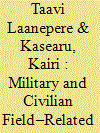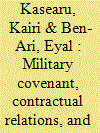| Srl | Item |
| 1 |
ID:
181157


|
|
|
|
|
| Summary/Abstract |
The military service readiness of reserve soldiers is an essential question for countries that rely mostly on reserve units for their defense or other operational needs. This study examines how forms of capital related to the military and civilian fields are associated with the military service readiness of reservists. Survey data were obtained from 396 Estonian reservists during the 2018 Hedgehog exercise. Reservists’ military service readiness (RMSR) was studied first with respect to military field–related factors, and in the next phase civilian field linked factors are included. In a military field, cultural, social, and symbolic capital have a positive influence on RMSR. However, if civilian field–related social and economic capital is included, some military capitals would lose their effect. Study outcomes are discussed considering Pierre Bourdieu’s theory of the forms of capital.
|
|
|
|
|
|
|
|
|
|
|
|
|
|
|
|
| 2 |
ID:
190786


|
|
|
|
|
| Summary/Abstract |
The military covenant is a set of morally binding expectations marking the exchange between military, society, and the state. Its base is the military’s duality: like other large public institutions delivering services and its uniqueness in holding the monopoly over the use of legitimate organized state violence. The covenant is a form of relational (not transactional) contract based on trust between, and a long-term orientation of, partners; it both orders and displays these relations thereby offering both prescriptions for action and discursive means to legitimate them. The covenant can be used as an analytical (not normative) concept for theoretical development in three areas: social change and society-military ties, processual aspects of agreements between individuals and groups and the armed forces, and links between society-military ties and the social contract and social cohesion. We use the case of Estonia to illustrate the theoretical potential of the military covenant.
|
|
|
|
|
|
|
|
|
|
|
|
|
|
|
|